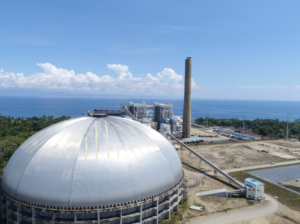
KUALA LUMPUR, Malaysia—Therma Visayas Inc., a subsidiary of Aboitiz Power Corp., is in talks with contractors to build and complete its planned 150-megawatt coal expansion project in Toledo, Cebu by end-2027.
Aboitiz Power Thermal Group chief operating officer Ronaldo Ramos said at the sidelines of Enlist Asia 2024 Conference and Exhibition here that talks were ongoing with possible contractors who could meet the operational deadline of the power plant.
“We’re looking at before the end of 2027. [It will be] operational already,” Ramos said, adding that demand in Visayas would rise by 2027.
“So we want to be able to serve the grid. If we get delayed, there will be a huge problem,” he said.
Ramos said negotiations with banks were also ongoing for the plant’s fund-raising activity which is targeted for the fourth quarter.
Meanwhile, Ramos said in a presentation in a panel discussion that “the right catalysts or triggers” to enable a just energy transition should be considered for the Philippines.
He said the Philippine economy is poised to grow 6.2 percent next year, while energy demand is also seen increasing 6.6 percent annually,
“These are some of the realities that my country faces when it comes to the energy transition. We haven’t solved the problems of energy security and affordability yet, but we feel the pressure to accelerate our decarbonization. Even when we contribute less than 1 percent of total global greenhouse gas emissions,” Ramos said.
He said the energy transition “should not be a race where nations are pitted against each other; rather, it is a thoughtful journey shaped by the local and global collaboration.”
“If we are to accelerate the transition, the triggers must be in place and the human transition into prosperity must be fulfilled. Global support will play a vital role in empowering developing nations to have a sustainable energy transition that aligns with economic realities. Rather than setting rigid targets or imposing penalties, developed nations can contribute by offering practical support—whether through investments, technology sharing, or funding mechanisms that help make renewable energy more accessible and affordable,” he said.
Ramos said “there is no one-size-fits-all in this energy transition nor a single solution” to providing the growing energy requirement of countries.
“We must progress at a pace that aligns with our economic realities while contributing to global efforts. It’s not just about how fast we move, but how effectively we ensure that no one is left behind,” he said.
Ramos said each country has a different transition pathway which should be guided in “consideration of the country’s level of responsibility, capability, and vulnerability to climate change.”
He said the Philippines accounts for less than 1 percent of total global emissions.


Be the first to comment